Developers Spent 1.3 Billion Minutes Using freeCodeCamp in 2020, and Other Year-end Facts
 Quincy Larson
Quincy Larson
This is a quick update on the state of the freeCodeCamp community heading into 2021.
First, some metrics:
- In 2020 freeCodeCamp's entire operating budget was only $498,521.
- With that humble budget, our nonprofit was able to deliver more than 1.3 BILLION minutes of instruction - the equivalent of 2,519 years of learning by people around the world.
- At our current level of capital efficiency, every dollar you donate to freeCodeCamp provides nearly 50 hours of learning for people around the world.
For some perspective, I've met individual developers who work at FAANG companies and earn more than $498K per year just from doing their jobs. And we're running an entire global nonprofit with that.
(By the way, thanks to the 6,560 kind people who support freeCodeCamp with monthly donation of $5. If you aren't donating yet, you can join these awesome supporters here.)
2020 was a long, long year for a number of reasons. But the good news is that a lot of people used their free time to expand their skills this year. And many of them use freeCodeCamp as a learning resource to do this.
First you may wonder whether the community is still growing. We most definitely are.
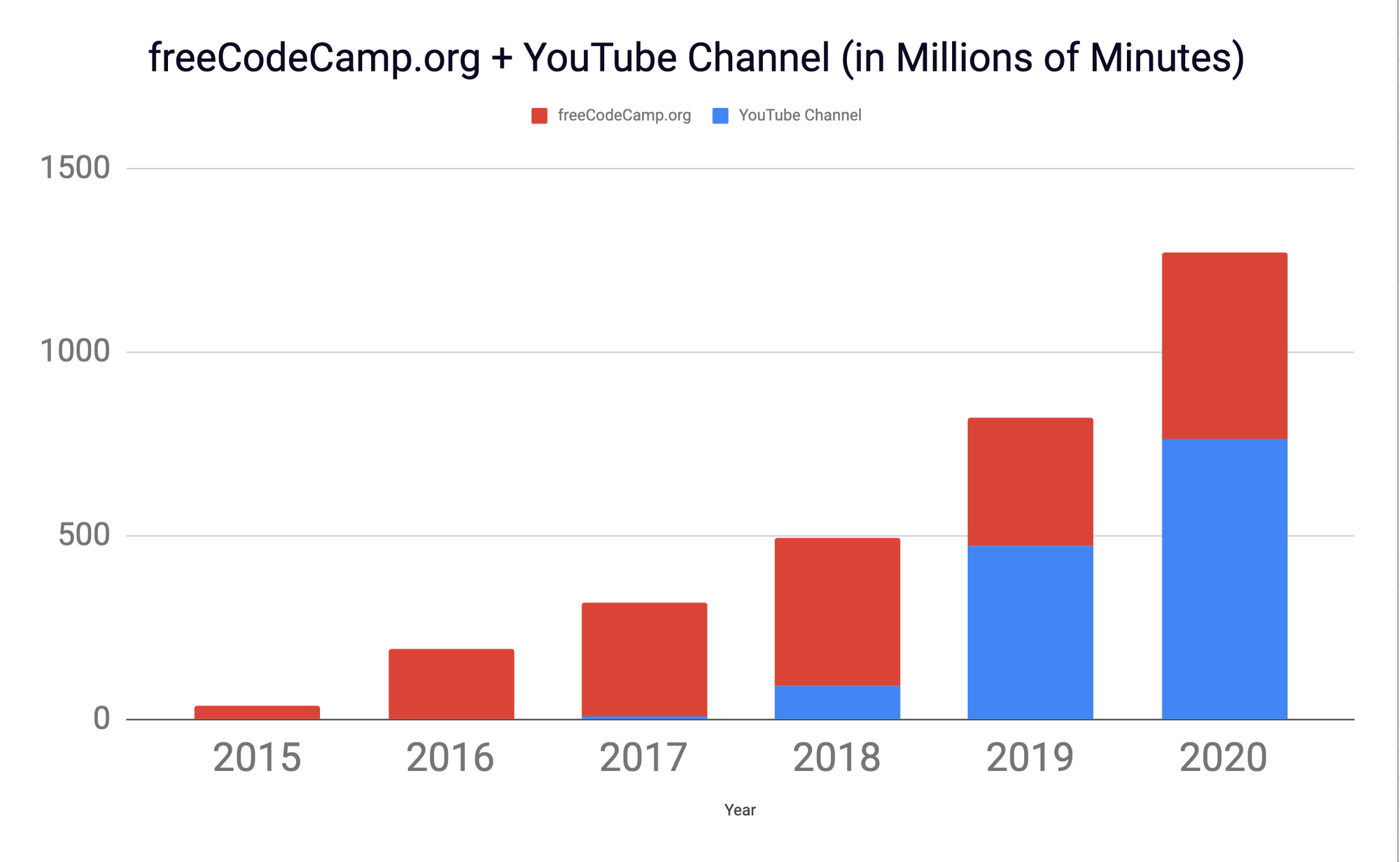 Both freeCodeCamp.org and our community YouTube channel have been steadily growing each year since 2015.
Both freeCodeCamp.org and our community YouTube channel have been steadily growing each year since 2015.
Wait, a bar chart? OK, you got me. Here are the exact numbers in their un-rounded glory:
+------+------------------+-------------+---------------+
| Year | freeCodeCamp.org | YouTube | Yearly Total |
+------+------------------+-------------+---------------+
| 2015 | 37,367,085 | 246,639 | 37,613,724 |
| 2016 | 189,054,404 | 1,449,703 | 190,504,107 |
| 2017 | 307,802,640 | 8,331,843 | 316,134,483 |
| 2018 | 401,473,441 | 92,197,551 | 493,670,992 |
| 2019 | 347,393,464 | 474,000,000 | 821,393,464 |
| 2020 | 508,054,160 | 764,332,218 | 1,272,386,378 |
+------+------------------+-------------+---------------+
High-level overview time. There are 4 pillars of the freeCodeCamp community:
Pillar #1: The freeCodeCamp Curriculum
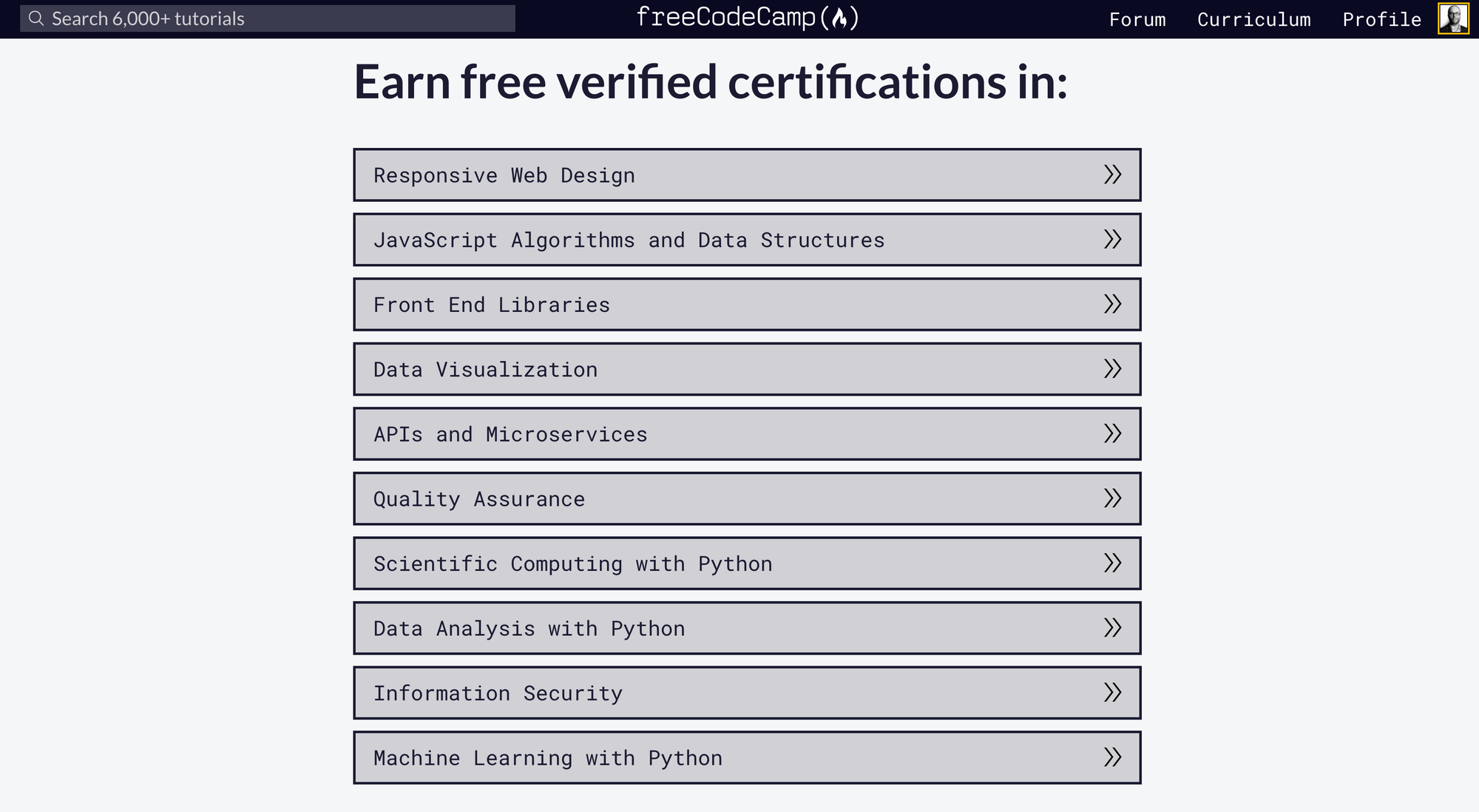 The 10 verified certifications you can earn if you can power through our lengthy, no-nonsense curriculum.
The 10 verified certifications you can earn if you can power through our lengthy, no-nonsense curriculum.
freeCodeCamp has a 3,000-hour, 10 certification-long software engineering curriculum. As of December 2020, we have over 110,000 people who self-report themselves as alumni (listing at least one certification on their LinkedIn profile).
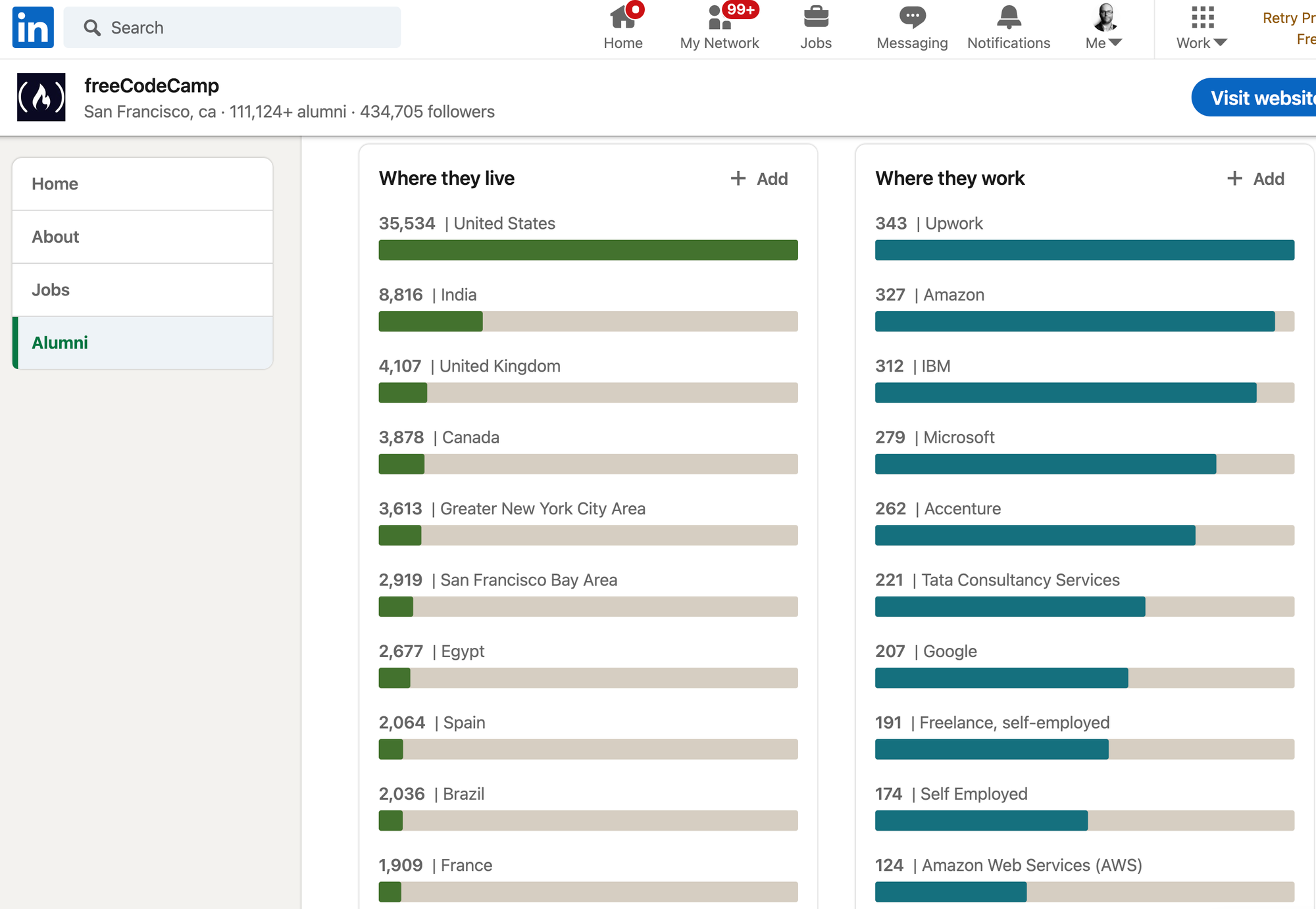 Where some of our alumni are from, and where they now work
Where some of our alumni are from, and where they now work
Many of these people were already working as developers when they started using freeCodeCamp, but at least 40,000 of them got their first tech job after earning a certification.
This is a conservative estimate of how many careers the freeCodeCamp community has helped.
On that note, if you're reading this and haven't added your freeCodeCamp certifications to your LinkedIn profile, we added a button below your certification you can click to do so.
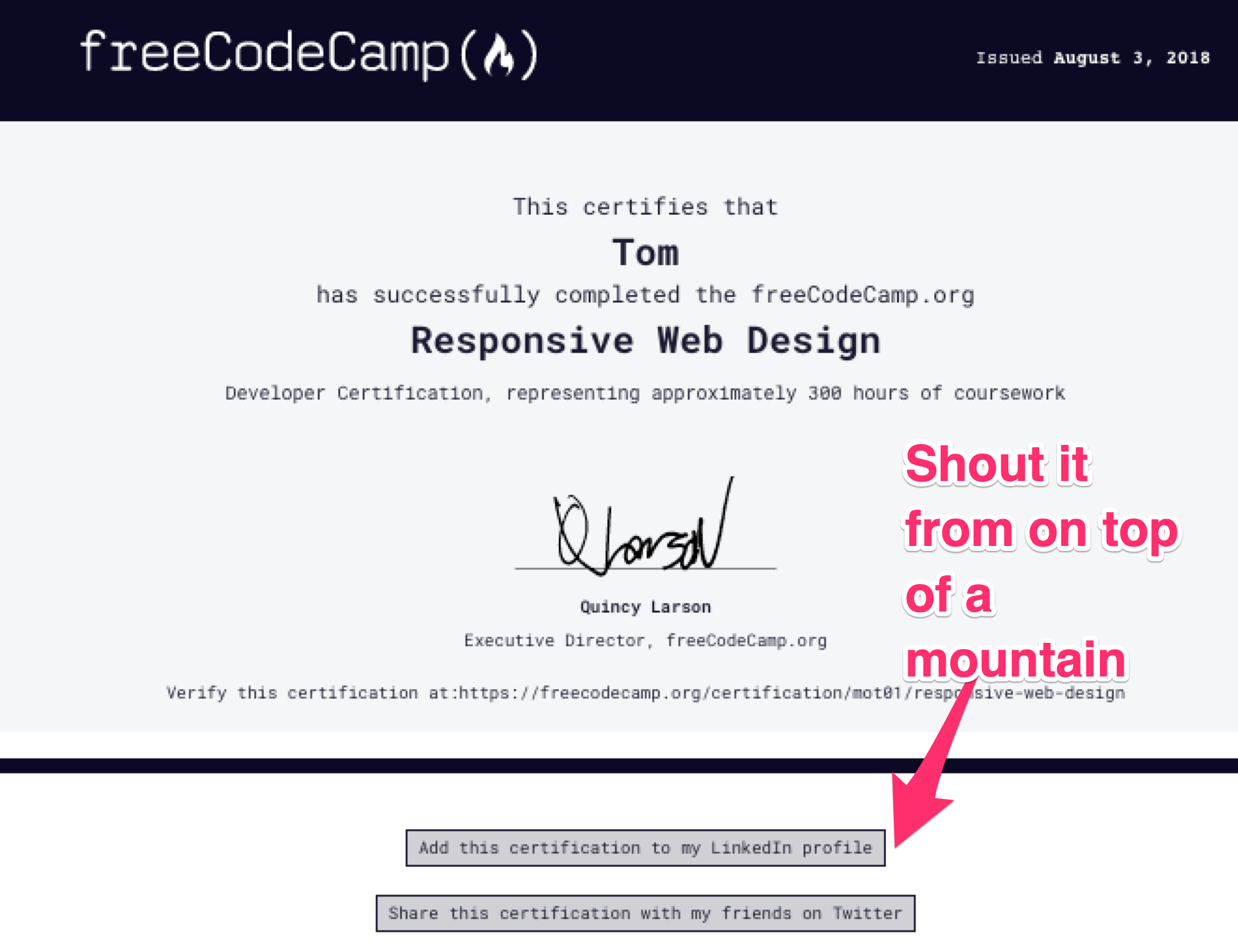 You can click the "Add this certification to my LinkedIn profile" button below your certifications.
You can click the "Add this certification to my LinkedIn profile" button below your certifications.
We made significant progress on Version 7.0 of the freeCodeCamp curriculum this year, and shipped 4 new Python-focused certifications you can earn:
- Scientific Computing
- Data Analysis
- Machine Learning
- Information Security
And we're just getting started. We have over 50 guided projects (with full test suites) in the works. You can read more about the big curriculum update here.
Pillar #2: The freeCodeCamp Publication
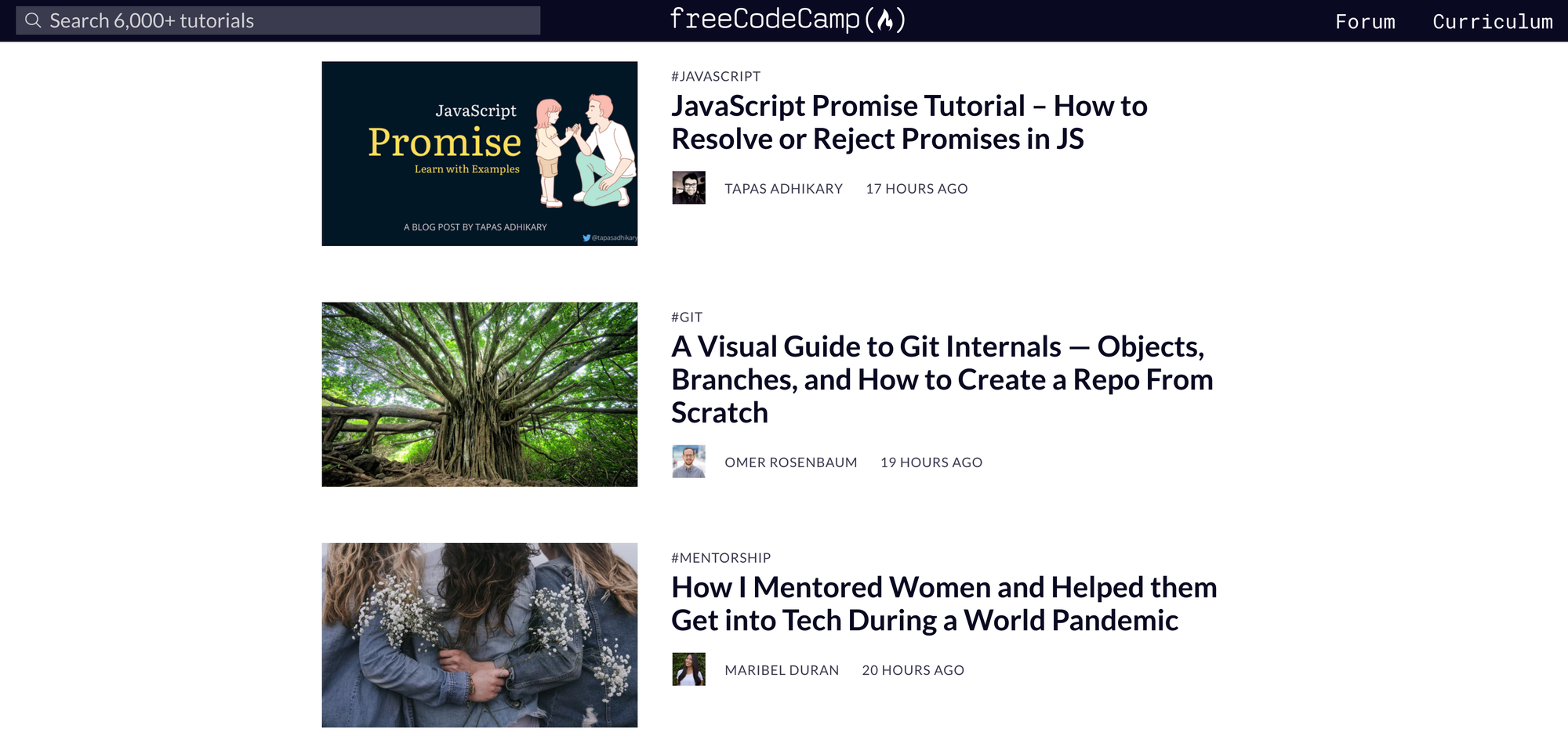 A screenshot of the freeCodeCamp publication
A screenshot of the freeCodeCamp publication
In 2019, we moved freeCodeCamp's publication off of Medium.com and over onto our own self-hosted infrastructure. The result: a faster, cleaner user experience.
At one point, freeCodeCamp's publication represented about 10% of all traffic to Medium, and our self-hosted publication is now even larger than that.
We publish about 20 articles each week – all carefully curated and edited by our editorial team. It's sort of like an academic journal for developers.
Above all else, we emphasize quality and relevance to our audience of developers. And the net result is a broad readership of people around the world who are learning new skills.
10 of the most popular freeCodeCamp articles of 2020
Here are 10 of our publication's most popular articles from 2020.
You may want to bookmark them, because these are so jam-packed with information that many of them will demand multiple sittings to get through.
- System Design Interview Questions – Concepts You Should Know by Zubin Pratap
- The Linux Command Handbook by Flavio Copes
- Dijkstra's Shortest Path Algorithm – A Detailed and Visual Introduction by Estefania Cassingena Navone
- The Complete Freelance Web Developer Guide: How to Make Money Through Freelance Programming Jobs by Luke Ciciliano
- 23 Alternative Career Paths that Software Developers Can Grow Into by Karl Hughes
- The Ultimate Guide to Python: How to Go From Beginner to Pro by Sharvin Shah
- The Docker Handbook by Farhan Hasin Chowdhury
- What I Learned from Doing 60+ Technical Interviews in 30 Days by Uduak Obong-Eren
- 9 Key Machine Learning Algorithms Explained in Plain English by Nick McCullum
- How to build a PWA from scratch with HTML, CSS, and JavaScript by Ibrahima Ndaw
Pillar #3: The freeCodeCamp Forum
The freeCodeCamp Forum continues to be one of the politest places to talk about technology on the web. You can ask programming questions to the community or get constructive feedback on your projects.
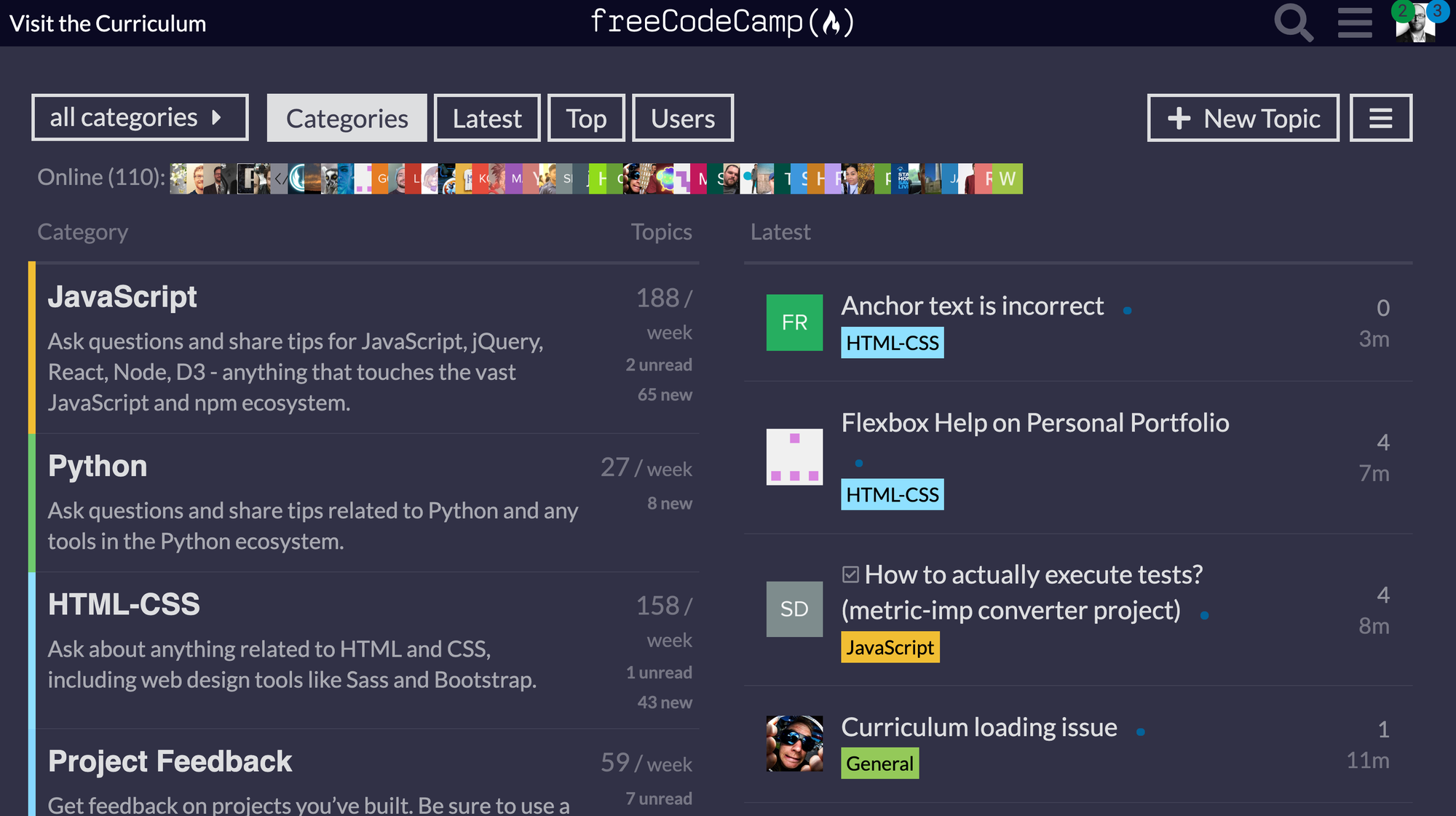 A screenshot of the freeCodeCamp forum
A screenshot of the freeCodeCamp forum
In 2020, people spent about 124,019,921 minutes (235 years) on the freeCodeCamp forum. That is a lot of time spent helping fellow developers.
And of course the reason it's such a polite, productive place is because we have awesome people who hang out there and help people. Here are the most helpful people of the past year. (Full browsable leaderboard)
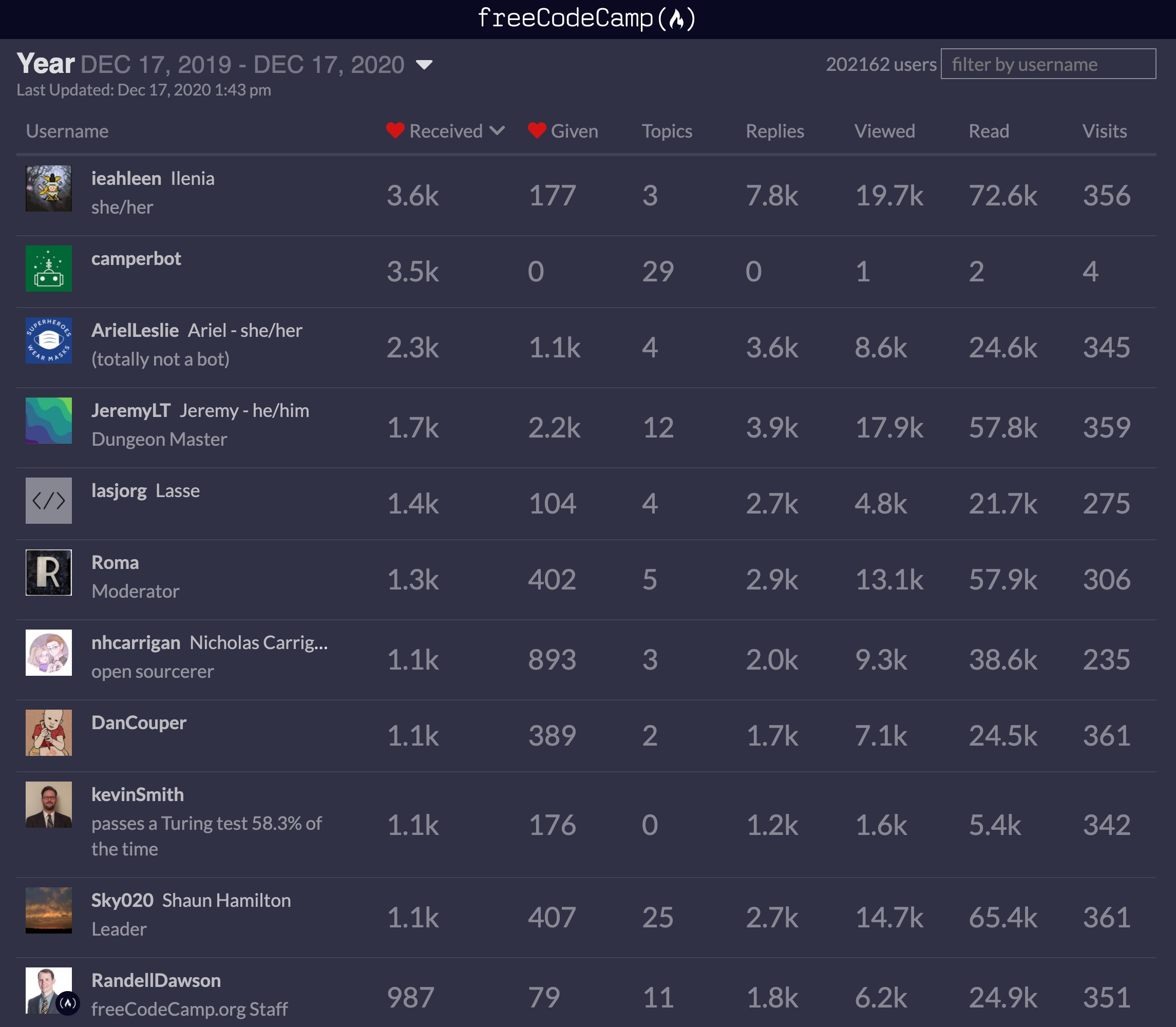 The 10 most helpful people on the forum this past year, based on the number of hearts they received from other campers. Camperbot is very helpful, but isn't a person. Sorry, Camperbot. You don't count. But thanks for everything you do.
The 10 most helpful people on the forum this past year, based on the number of hearts they received from other campers. Camperbot is very helpful, but isn't a person. Sorry, Camperbot. You don't count. But thanks for everything you do.
Pillar #4: The freeCodeCamp community YouTube Channel
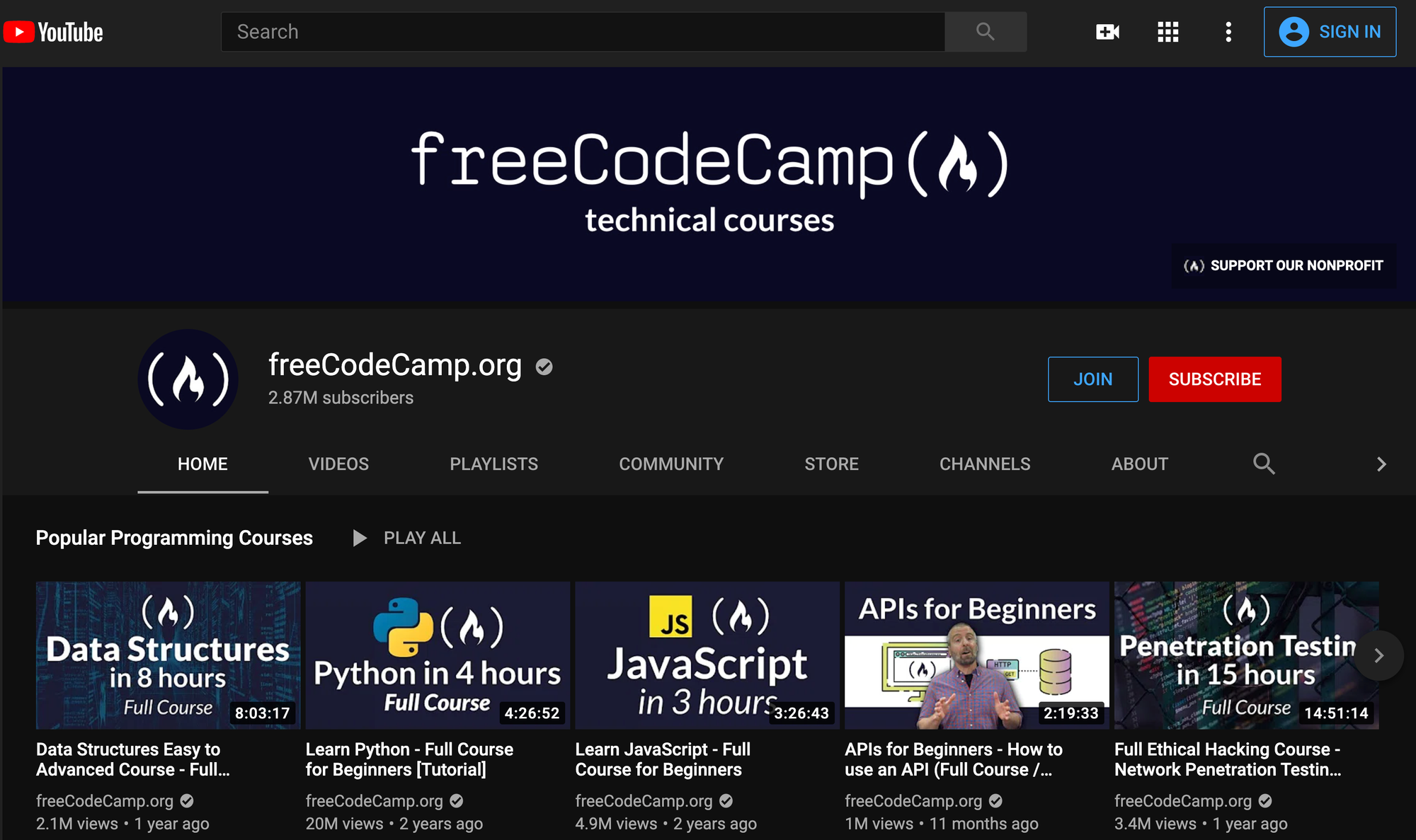 A screenshot of the freeCodeCamp community YouTube channel
A screenshot of the freeCodeCamp community YouTube channel
Last but not least, we have the freeCodeCamp community YouTube channel. We post free full-length courses there on math, computer science, and programming.
In 2020, we posted more than 120 full-length courses there, each with an average length of 5 hours. That's a lot of free learning resources.
Video courses are a great way to teach people around the world, and are a convenient way to learn even when you're away from a keyboard. And people spent a lot of time learning:
 YouTube analytics for the past year. Campers watched more than 12 million hours of programming courses on freeCodeCamp's YouTube channel.
YouTube analytics for the past year. Campers watched more than 12 million hours of programming courses on freeCodeCamp's YouTube channel.
The freeCodeCamp community's channel is now the biggest programming-focused channel on YouTube. But we are just getting started.
The 5 most popular freeCodeCamp YouTube courses of 2020
Here are the most widely-viewed courses from among the 120 new courses we published in 2020:
- TensorFlow 2.0 Complete Course – 7 hour course by Tim Ruscica
- Calculus 1 - Full College Course – 12 hour course by Dr. Linda Green (Professor at University of North Carolina–Chapel Hill)
- Android Development for Beginners – 15 hour course by Meisam Mansourzadeh
- Microsoft Azure Fundamentals Certification Course – 3 hour course by Andrew Brown
- Introduction to Programming and Computer Science – 2 hour course by Steven and Sean
Again, you can bookmark these and watch them later. Unless you want to sit through all of them now.
And if you check the comments on these videos, you will almost always see someone comment: "Just one more video before bed, Mom!" Yes. I see you, commenter. I see you.
Sustainability – How is our nonprofit doing?
This is the part where I say, "If you don't donate to our nonprofit, freeCodeCamp will cease to exist, our servers will sputter to a halt, and Quincy will have to sell one of his kidneys to cover next month's AWS bill."
Except that isn't true. Not at all. The reality is our nonprofit has been careful about how we allocate our scarce donor funds. And we are operating well within our means.
We try to be as open as possible about how we run our nonprofit. For example, we have a platinum transparency rating from GuideStar.org.
And if you're curious, here's our most recent 990. This is, essentially, an annual report that nonprofits file with the US government.
We have a 10 year project road map in thanks to our careful planning. We don't have any investors or corporate interests to answer to. We answer only to you – our community.
And I hope we are doing a good job of giving you what you all want: excellent free learning resources on math, computer science, and programming. Because we are going to be doing more of that. With your help (and your donations) we can do a lot more.
Remember those numbers from earlier? For every dollar donated we turn around and provide nearly 50 hours of learning to people around the world. If you want to support an extremely donation-efficient nonprofit, you can become a monthly supporter here. US $5 is all we ask.
 The number of people who are supporting freeCodeCamp through $5 / month donations is growing. Currently: 6,560. (And yes, it is possible to support our nonprofit through GitHub.)
The number of people who are supporting freeCodeCamp through $5 / month donations is growing. Currently: 6,560. (And yes, it is possible to support our nonprofit through GitHub.)
And if you don't have $5 per month, no problem. We will always be free. You can support us later if you want to, once you're getting paid to apply these newly-earned developer skills.
And if you have a little extra cash at the end of the year, you can send us a one time donation through PayPal of whatever amount you feel is right.
Your donations will help us expand our budget and the scale of our mission: to help people learn to code for free by creating videos, articles, and interactive coding lessons - all freely available to the public.
Thank you for taking the time to read this quick recap of our community in 2020. 2021 is going to be a big year for the community. And I'm excited to have you here along with us.
Merry Christmas, happy holidays, and see you in 2021.
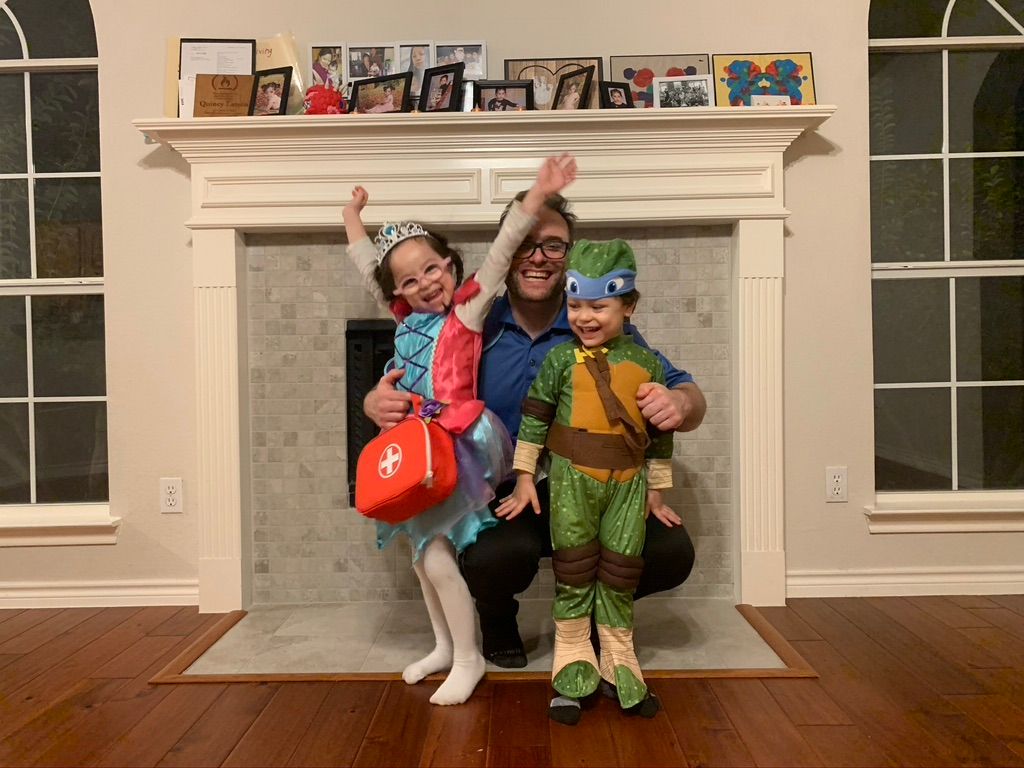 Me with the kids: Jocelyn and Quentin. They'll learn to code when they feel ready :)
Me with the kids: Jocelyn and Quentin. They'll learn to code when they feel ready :)
Subscribe to my newsletter
Read articles from Quincy Larson directly inside your inbox. Subscribe to the newsletter, and don't miss out.
Written by
